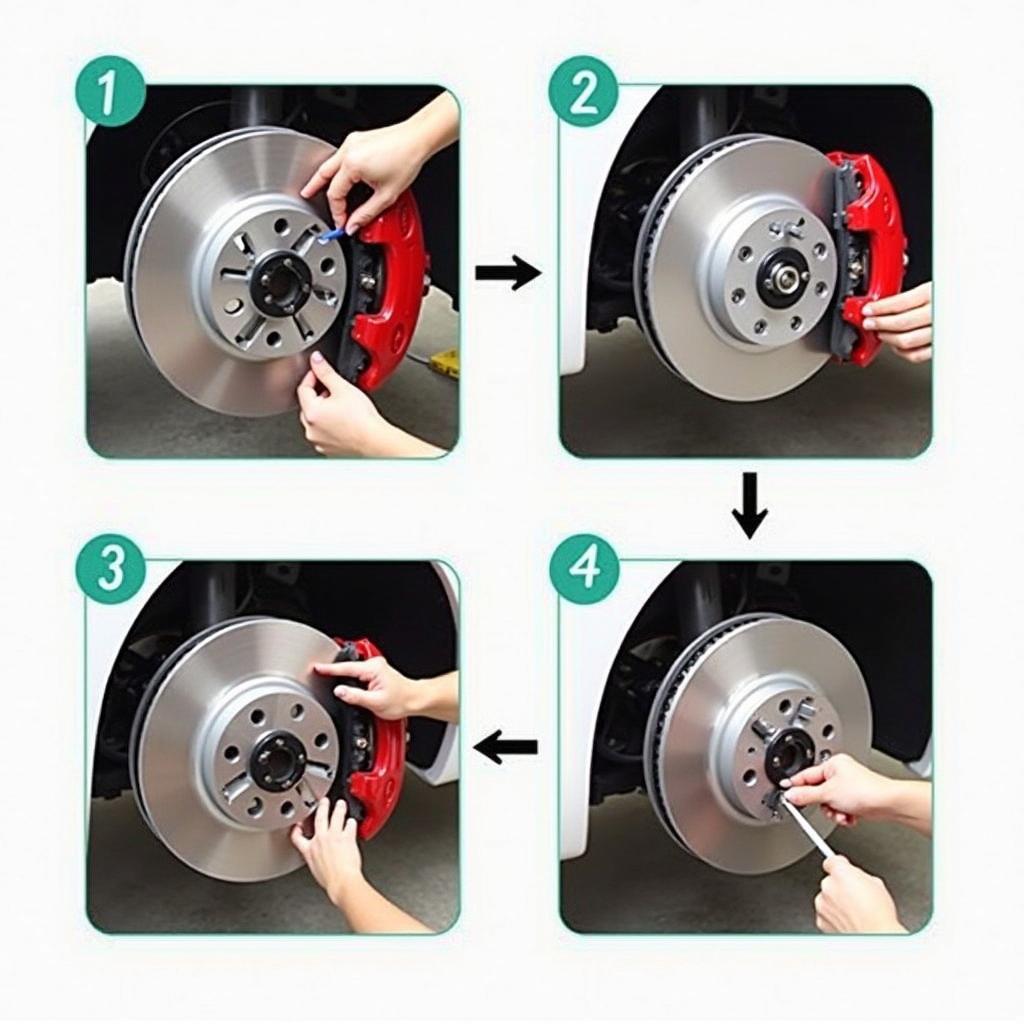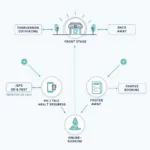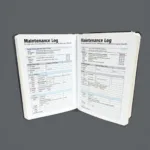Hearing your Car Brakes Making Sound After Servicing can be frustrating. You just paid to have them fixed, and now something seems wrong! Don’t panic. This article will explore the common reasons why your brakes might be noisy after a service, what those noises might mean, and what you can do about it.
Common Causes of Brake Noise After Servicing
There are several reasons why your car brakes might be making sound after servicing. Sometimes it’s a simple fix, other times it indicates a more serious issue. Let’s break down the possibilities:
New Brake Pads and Rotors
The most common cause of noise after a brake job is new brake pads and rotors. These components need time to “bed in,” meaning the surfaces need to wear against each other to create a smooth, even contact patch. During this break-in period, you might hear squealing, squeaking, or grinding noises, especially when applying light pressure to the brakes.
Improper Installation
While less common, improper installation can also lead to brake noise. This could include incorrectly installed pads, calipers, or rotors. If a component isn’t seated correctly, it can cause vibrations and rubbing, resulting in various noises.
Dust and Debris
Sometimes, dust, debris, or small stones can get lodged between the brake pads and rotors during or after servicing. This can cause a grinding or scraping sound, especially when braking at low speeds.
Low-Quality Brake Pads
Using low-quality brake pads can also contribute to noise. These pads might be made of materials that are more prone to squealing or squeaking. They may also wear down faster, leading to premature brake problems.
Sticking Caliper
A sticking caliper can cause the brake pads to constantly rub against the rotor, leading to a continuous squealing or grinding sound and excessive heat buildup. This can be caused by a seized piston or slide pins in the caliper.
Warped Rotors
If your rotors are warped, they will not provide a smooth surface for the brake pads to contact. This can cause vibrations and a pulsating feeling in the brake pedal, often accompanied by a grinding or scraping noise.
Diagnosing the Problem
Identifying the specific cause of your brake noise requires careful observation and sometimes professional diagnosis. Pay attention to the type of noise, when it occurs, and under what conditions. Is it a squeal, a grind, or a squeak? Does it happen when you first apply the brakes, or is it constant? Does it change with speed or braking pressure? These details can help a mechanic pinpoint the problem.
What to Do If Your Brakes Are Making Noise After Servicing
- Return to the service center: If the noise started immediately after servicing, the most straightforward solution is to return to the shop that performed the work. They should be able to diagnose and fix the issue, especially if it’s related to improper installation.
- Inspect for debris: Check for any visible signs of debris lodged between the brake pads and rotors. Sometimes, a simple cleaning can resolve the problem.
- Bed in the brakes: If you have new brakes, follow the proper bed-in procedure recommended by the brake manufacturer or your mechanic. This typically involves a series of moderate stops to help the pads and rotors mate properly.
- Consult a qualified mechanic: If the noise persists or worsens, consult a qualified mechanic for a thorough inspection and diagnosis. Ignoring brake problems can lead to more serious and costly repairs down the road.
Why Are My Brakes Squeaking After New Pads and Rotors?
New brake pads and rotors often squeak because they haven’t had time to wear in. This is a normal occurrence and usually resolves itself after a break-in period.
Can Warped Rotors Cause a Grinding Noise?
Yes, warped rotors can cause a grinding noise as they provide an uneven surface for the brake pads to contact.
How Long Does it Take for New Brakes to Stop Squeaking?
New brakes typically stop squeaking after a break-in period of a few hundred miles.
Conclusion
Car brakes making sound after servicing can be disconcerting, but it’s not always a sign of a major problem. By understanding the common causes and taking appropriate action, you can ensure your brakes are functioning safely and quietly. Remember, your safety is paramount, so never hesitate to seek professional help if you have concerns about your brakes.
FAQ
- Why are my brakes squealing after being serviced? Possible causes include new pads and rotors needing to bed in, dust and debris, or a sticking caliper.
- Should I be worried if my brakes are grinding after a brake job? Yes, grinding often indicates a more serious issue like warped rotors or a foreign object lodged in the brakes.
- How can I fix squeaky brakes after a service? Returning to the service center, checking for debris, or bedding in new brakes can often resolve the issue.
- What does it mean when my brakes make a clicking sound? A clicking sound could indicate a loose component or a problem with the anti-lock braking system (ABS).
- Is it normal for new brakes to make noise? Some noise is normal for new brakes as the pads and rotors bed in.
- How long does it take for new brake pads to settle? New brake pads typically settle within a few hundred miles of driving.
- When should I take my car back to the mechanic for brake noise? If the noise persists, worsens, or is accompanied by other symptoms, take your car back to the mechanic immediately.
Need more assistance? Have further questions? Explore our other helpful articles on CarServiceRemote, covering various car maintenance and repair topics. You can find related articles on brake maintenance, troubleshooting brake noises, and choosing the right brake pads for your vehicle.
Contact us for 24/7 support via WhatsApp: +1(641)206-8880 or Email: [email protected]. Our team is ready to assist you with any car service-related questions.


